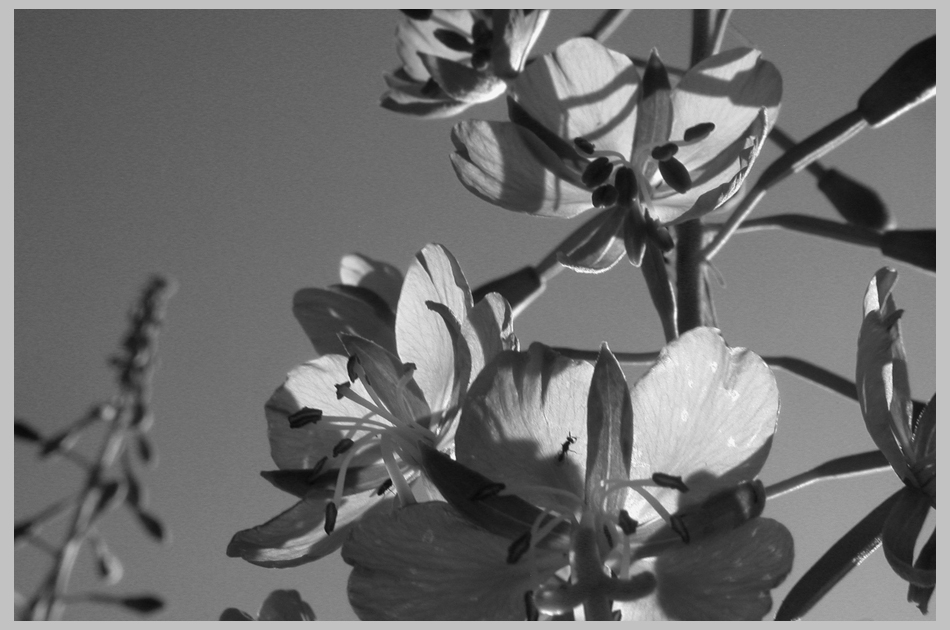
Fireweed Flower Forms, (Epilobium angustifolium, a member of the Evening Primrose
family, and a circumpolar species of great beauty) Eagle Cap Wilderness
On the road in the American Northwest.

Fireweed Flower Forms, (Epilobium angustifolium, a member of the Evening Primrose
family, and a circumpolar species of great beauty) Eagle Cap Wilderness
On the road in the American Northwest.
MUSIC & POETRY AS A NECESSARY UNITY
In my Circle in the Square performance project, one of the primary problems
addressed is the fragmentation of poetry and music. In the view explored here, poetry
and music form a kind of necessary unity—that is to say that they cannot survive let
alone flourish without one another. Yet only a cursory look at contemporary practice
reveals that poetry and music exist in largely separate worlds, rarely crossing borders
or showing any kind of what I suppose academics might call interdisciplinary interest.
Poets in the English speaking world publish their work in written form, largely for
other poets. And New Music composers in both Europe and America publish their
work by means of recordings, and, in a remarkably parallel way, largely for other
composers or new music specialists.Given the tremendous difficulty of understanding the origins of this kind of cultural
fragmentation, which is so characteristic of Western society at present, I think it is best
to be simple and direct in one's approach. By this I mean: Place both poetry and music
under one roof, so to speak, like two parties of a loving relationship who have somehow
become estranged from one another, and simply make sure they stay there. In other words:
Do poetry; Do music—and then—do them always together. In concerts; in presentations
of every description; and in one's own work as an artist. The key thing is that they
remain together, and that along the way, we become aware of I would argue not so
much new ways of unifying them, but rather new ways of looking at their shared,
common source.It is in this spirit that I've undertaken the composition of a number of new song
cycles. The Shepherd's Purse—-for soprano, oboe and harp,
is the second of these. | go to Intro: The Shepherd's Purse, for materials
and performance models, etc. |
THREE METAPHYSICAL MINIATURES
(I)
We shape the world and the world shapes us.
To love the plants is to know them. To know plants is
to make them your friend. To make plants your friend
is to greatly expand the happy circumference of the
circle of your community. The child who grows up safe,
protected and able to learn within such a circle of plant-
friends will receive the gift of a wonderfully enriched
and lasting notion of home.
(II)
We shape the world and the world shapes us.
Just as no one ever wanted to cloud the skies with
the smoky haze of accumulated car exhaust, or wanted
streams to run muddy with human waste, no one ever
intended the world to become a noisy place. But noisy
it is, all the same.
And, now that noise has become a part of practically
every landscape—even the most isolated and highest
mountain ranges have jets roaring above them—how
shall we ever know what the deeper, more subtle effects
of noise really are? On the human psyche? Or on Nature
as a whole? For the question has in a way become:
where are the control groups to be found? And where is
there by now even a single researcher to be had who has
not been to some extent profoundly conditioned—even
while still in the womb—by a sea of surrounding noise?
I wouldn't pretend to know, but my guess is that noise
works on the mind something like a contracting air-tight
room. As the noise levels increase, the walls of the room
close in and the pressure builds. Finally, one finds one's
face pushed up against the wall, until one can no longer
hear oneself talk, or even think. An ur-scream of almost
unbearable angst would almost certainly be the result.
Remarkably, no one designed this environment, or
intended this to happen. It just did.
I sometimes ask myself what would be the composite
sound if we were all to cry out like this together, at the
same time? We may soon find out.
III)
We shape the world and the world shapes us.
Every habit quickly becomes its own formative cause.
And there's nothing more habit-forming than getting
something for nothing: plunder of war, slavery, compound
interest, theft. Who will be the first to demonstrate the
simplicity and power of a new ethics, where work is
exchanged equitably for work, and time is exchanged
in equal measure for time, and no one has the right
ethically to more land than to meet his or her family's,
or collective or community of friend's, needs?
Pine Lakes Camp,
Eagle Cap Wilderness,
Oregon, X.28.2008
